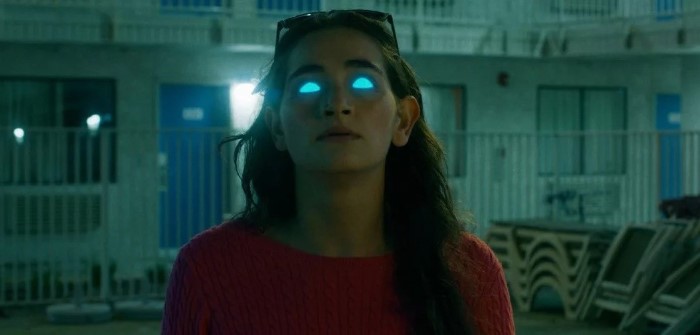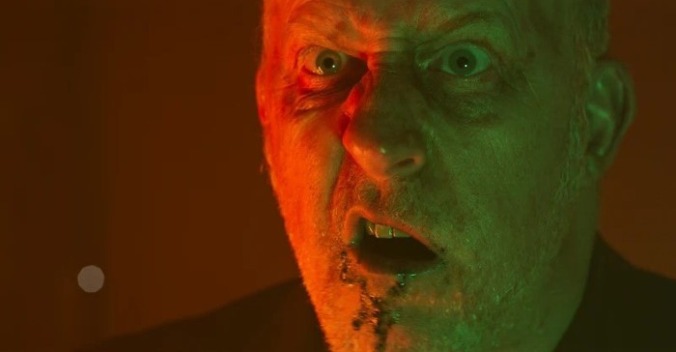“Until We Become Something”: Exploring 2024’s Trio of Body Snatcher Movies

“We are nothing. Until we become something,” thrums “La Voix” (Dimitri Doré) to Elsa (Megan Northam) in Jérémy Clapin’s new film, Meanwhile on Earth. True to character, Elsa floats desultorily on a lake as she bandies with the disembodied presence through a translucent flower bud, embedded in her ear like an AirPod; she’s ambivalent about ambition, and too bereaved to muster a whiff of giddyup for any activity. Bargaining for long-lost brother Franck’s (Yoan Germain Le mat) return is the most responsibility she’s shouldered since his disappearance three years prior to the film’s events.
The proof? Elsa doesn’t buy what the voice is selling. “What’s the point of becoming us if you can’t be yourselves?” she responds–silently, like La Voix, but with supreme muted contempt.
Meanwhile on Earth caps off a respectable slate of body snatcher cinema in 2024, comprising Alice Maio Mackay’s T-Blockers (released March 5) and Zach Clark’s The Becomers (released August 23). Taken as a trio, these films demonstrate the niche’s malleability on aesthetic as well as subtextual terms; apart from the “body snatcher” motif, they bear little resemblance to each other in tone, atmosphere, and intent. T-Blockers, kin to Gunn, Dekker, and Cronenberg, tracks the conversion of Australian men by literal brain worms that turn them into violent misogynists; The Becomers makes a goopy and goofy record of America’s gradual cultural unraveling under the strain of the COVID-19 pandemic; Meanwhile on Earth weighs the morality of sacrifice against questions about anonymity and identity that relate to terminal onlinehood.
Clocking the sociopolitical anxieties of their day is traditional to movies filed under the “body snatcher” category: See Don Siegel’s 1956 classic Invasion of the Body Snatchers, Philip Kaufman’s 1978 update, Abel Ferrara’s in 1993, and Oliver Hirschbiegel’s in 2007, and that’s not counting slews of other movies that don’t borrow from Jack Finney’s 1954 novel for their bases like this quartet does. Ferrara, for example, relocates Finney’s original text from Marin County, California, to an Alabama Army base, where he critiques unwavering conformity in the American military; Kaufman writes a dirge for the death of the 1960s counterculture. It should be no different that T-Blockers, The Becomers and Meanwhile on Earth each keep up with that tradition. But there’s something else, something new, baked into these films on a molecular level, too: A lamentation on how goddamn hard it is to be human.
This is such a basic observation that putting it into words feels tantamount to taking it for granted. Of course it’s hard to be human. We’re not too busy existing in a post-2016 world, a post-quarantine world, a post-January 6th world, to appreciate that to be alive in 2024 is to wake up each day and tackle feats Hercules might’ve passed on; if you can haul your ass out of bed and make yourself breakfast every morning without hesitating, congratulations: You’re a warrior. Essentials are expensive. Housing is cost prohibitive (and there seems to be no turning point in sight where this will start changing). We know this. We live this. It’s a burden, or a small part of a larger burden comprising tiresome horseshit and debilitating madness spanning all sectors of contemporary human existence. You know who doesn’t know this? That voice in Elsa’s ear.
Neither do the mottled, tridactyl extraterrestrials in The Becomers, who hide their true forms by mimicking the appearances of unsuspecting people, then summarily dissolving the poor bastards alive in a deluge of digestive materials: First, a hunter (Conrad Dean), then a pregnant woman in labor (Isabel Alamin), then Carol (Molly Plunk), a suburban housewife who clings with religious fervor to deranged far-right ideology. Losing a Carol in exchange for a befuddled alien wearing her face strikes as an upgrade, though in time, “Carol” and her lover, who eventually nicks the form of the real Carol’s husband Gordon (Mike Lopez), grow uneasy with the mechanism by which they endure; melting innocent folks, insomuch as Gordon and Carol can be called “innocent,” is a high cost for survival, to say nothing of the fate of the pregnant woman’s infant. (If it helps, the baby likely dies before its not-mother tosses its body in a flaming trash barrel.)

Maybe it’s justice, then, that “Carol” and “Gordon” are embroiled in a conspiracy theory in the Pizzagate ballpark. Welcome to Earth: People are out of their fucking gourds. In contrast, T-Blockers’s alien parasites don’t give a damn about their victims’ psyches. Unlike “Carol” and “Gordon,” no cost is too high to achieve their body snatcher goal of proliferation. Mackay wisely chooses the bailiwick of commentators-cum-sentient hog pizzles like Gavin McInnis, Jordan Peterson and Andrew Tate as source material, and worms as the vehicle for her metaphor; young men stumble into spaces curated by braying jackasses with chips on their shoulder about non-existent crises of masculine identity, who rot the hapless schmucks’ minds and effectively render them as thuggish Dollar Tree zombies.
T-Blockers doesn’t consider modern existential difficulties the same way as The Becomers. It treats them as bedrock instead of top soil instead. Being a man in 2024 has more perks than you can count on all your digits, and make no mistake, but that’s how the predation of gender essentialists like Tate works: Guys don’t see them coming, until they’re at their most vulnerable, and thus more receptive to accepting hatred of women as their new raison d’être. The cycle pollutes male identity and ratchets up the dangers women face just by opening their laptops or setting foot outside their door. The worms, of course, aren’t interested in any of this. All that matters to these vermin is assimilating the next batch of random dudes. But Mackay and T-Blockers understand that cycle as an intrinsic component of culture right now, one that complicates the way we all live (save perhaps the Tates and the Petersons, who despite legal snafus seem to be doing just fine for themselves).

Clapin’s contribution to the extended dialogue between T-Blockers, The Becomers, and the present day realities they focus on, comes on the cusp of the latest Most Important Election Of Our Lifetimes, which both is and isn’t relevant to its structure. It’s a French movie, yes, though let’s not discount the turn to right-wing barbarity taken in European countries like Italy, and especially not the possibility that France will follow suit; what’s meaningful about Meanwhile on Earth is its apolitical stance. This isn’t to say Clapin is himself apolitical. Rather, he opts out of pointing to specific developments or milestones in politics in his script, which he wraps around a humanist narrative about grief. Elsa’s so broken up by Franck’s absence that she hardly bothers living her own life. When she’s given the chance to bring Franck home, she leaps at it, making a deal with “La Voix” to deliver five people for its non-corporeal kin to expropriate. Anyone will do. Elsa gets to pick. But the otherworldly voice is on a tight timeline, so she has to pick on the double-quick.
Like “Carol” and “Gordon” in The Becomers, ethics are an obstacle for her; unlike them, she’s so obsessed by the thought of having Franck around again that she’s not fussed at the thought of giving “La Voix” patients from the palliative care facility where she works as a nurse. To grieve is human. “La Voix” gives Elsa no rebuke for her choice of victims candidates, and why would it? “La Voix” isn’t human. The movie withholds a firmer explanation of what it is, though the nothingness it appears to claim for an identity is honestly enough to get on with. Only a being hailing from “nothing” would be apathetic about the bodies chosen as its host vessel, or threaten Elsa as it does when she balks at carrying out her mission. Emotion isn’t its strong suit.
But emotion is in our blood. It’s what gives us drive to move on after tragedy, as Elsa’s parents do, and it is at the same time the anchor that keeps us from moving on, as Elsa can’t bring herself to. Meanwhile on Earth is a deeply sad picture, and an appropriately melancholic pin to put in the year in body snatching. The experience of transformation under exterior pressure–fearmongering fascist propaganda, COVID lockdown’s rigors, gender prejudice’s tempting offer of blamelessness–is common in 2024; read swaths of different media outlets, and you’ll come across stories without end about people being shunned by their friends or disowned by their loved ones, who no longer recognize them after they undergo radicalization of one variety or another.
That’s the nature of the body snatcher subgenre: To show us ourselves, so that we might wrestle with who we’ve become. But Mackay, Clark, and Clapin each give their audiences the greater gift of compassion. Perhaps more so than their predecessors, T-Blockers, The Becomers, and Meanwhile on Earth are primed to make their viewers, struggling as they do to come to terms with the human condition, feel seen.
Bostonian culture journalist Andy Crump covers the movies, beer, music, and being a dad for way too many outlets, perhaps even yours. He has contributed to Paste since 2013. You can find his collected work at “his personal blog”:https://agcrump.wordpress.com. He’s composed of roughly 65% craft beer.







































